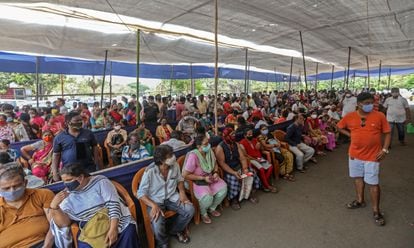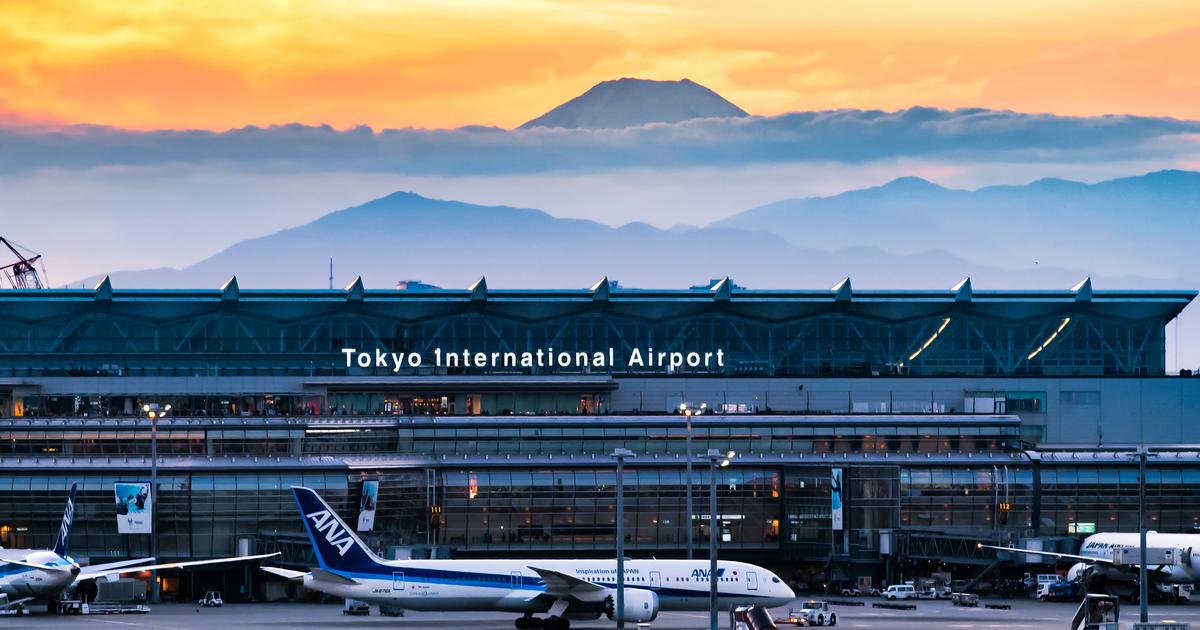The pandemic is rampant in India. The subcontinent has been breaking the world record for infections one day after another (352,991 this Monday); Hospitals, especially those in the capital, are collapsed, there is not enough oxygen to care for all the patients who need it and the skies of some large cities have been filled with smoke from mass cremations of the deceased by covid. Beyond the critical situation, experts are concerned with a variant that circulates in the country with a double mutation that makes it potentially more infective and resistant to vaccines, something that will have to be studied further.
The second most populous country in the world (1,366 million inhabitants, 29 times more than Spain) traveled without many surprises last spring, suffered a first wave that developed during the summer and reached its peak in September and reached a new low. in mid-February.
When some authorities and scientists in the country took the worst of the health crisis as controlled, a new wave began to grow, first at a gentle pace and then in an unbridled way.
Last week it added 1.6 million cases, and the cumulative incidence is 274 cases per 100,000 inhabitants in the last 14 days, according to the website My World in Data, a data repository of the University of Oxford.
The latest death toll set again a record: 2,336 on Sunday.
And the trend in all indicators is increasing.
More information
The challenge of manufacturing 14 billion vaccines
The reasons that have brought India to this point, having weathered the first wave of infections with relative success, are varied.
On the one hand, many point to a false sense of normalcy that caused restrictions to be relaxed.
“We were in a state of denial.
The nation is lost, ”says Swati Rane, an intensive care nurse from Bombay.
"We have been too optimistic and let our guard down," agrees Lancelot Pinto, an epidemiologist at the Hinduja National Hospital in the same city.
“If you look at the months of January, it seems as if the covid-19 has disappeared from our lives.
The massive gatherings started again, everything was reopened.
This contributed greatly to the spread of the virus, ”he notes.
"The second factor," continues the doctor, "is that this new variant of the virus seems much more contagious." Although the evidence still only makes this a very plausible hypothesis yet to be quantified, according to their estimates, if in the first wave one in five close contacts to a positive used to be infected, in this case, the proportion has skyrocketed: “We see families whole infected ”, he points out. In addition, it highlights the shortcomings of scientific research that suggested that the country was relatively close to herd immunity after the first wave, having infected around half of the adult population of the main cities. “These studies did not address the differences in prevalence between
slums
[shanty towns] and the more developed districts, where there were hardly any infections and which now represent around 80-90% of the infections that reach the hospital ”.
Another cause is the colossal challenge of vaccination in a country like India, "which is not going at the desired rate," warns the doctor.
The nurse adds that, as if that were not enough, "now there are people who are going to be vaccinated and are infected while waiting."
"The Indian healthcare system is in chaos," sums up Rane.
About 10% of the Indian population has received at least one dose of the vaccine, leaving more than a billion people still to be inoculated.
Suspects of being infected with the coronavirus wait to be treated in Mumbai.
Scientists from all over the world are closely watching the evolution of the virus in India and the characteristics of this new variant. Its peculiarity, explains Antonio López Guerrero, virologist and professor of Microbiology at the Department of Molecular Biology at the Autonomous University of Madrid, is that it combines two mutations. "They seem to give the virus more transmission capacity and, perhaps, resistance to immunization, either naturally or by vaccination," he says. This is, in his words, "worrying, like all variants." "Alarming? Just enough to try not to spread throughout Europe, as has already been seen in Germany, the United Kingdom and some other country ”, he concludes.
Of similar opinion is Marcos López Hoyos, president of the Spanish Immunology Society: “Vaccines can lose a certain percentage of effectiveness, but not all. The point is that the longer the virus is circulating and there are more infections, the more likely there are mutations that cause problems ”.
Fernando Simón, director of the Center for Coordination of Health Alerts and Emergencies, explained this Monday that the main concern about the virus crisis in India is more the volume of infected than the variant that, as he has said, has not yet proven to be more contagious nor more virulent. Several European countries are already imposing travel restrictions with India to prevent the variant from entering. They have, among others, France, the Netherlands and the United Kingdom. Spain, which requires negative PCR tests at origin for people arriving from high-risk areas, has not taken any additional limitations for the moment. Simón has explained that Health is monitoring the variant, but that Spain does not have direct flights with India,Therefore, it is now being considered whether to take more measures for those who arrive by means of transfers.
A "distressing" situation
During one of his few breaks, Dr. Pinto tells by telephone how "distressing" the situation has been in his Bombay hospital, although it has not reached the chaotic levels currently experienced in New Delhi or other parts of the world. country.
"Finding beds for patients is being stressful, many have had to be cared for from home," he warns.
Nurse Rane is even more pessimistic.
“In 2020 it was chaotic because it was something new, but now the situation is out of control.
I have never seen patients dying because there is no oxygen.
Or patients transferred to houses because there are no beds in the hospitals, ”he also laments from Bombay, where he now runs a health consultancy.
Pinto assures that the scene in Bombay, within the bad, "is fortunate" when compared with what is seen in other parts of the country.
“There are areas where it is extremely difficult to be admitted because there are no hospital beds.
We have been warned that the oxygen supply can become a problem here as well, and we are trying to rationalize it, switch to oxygen concentrators ... We are being very cautious ”, he adds.
Queue for vaccination in Bombay DIVYAKANT SOLANKI / EFE
The Indian Health Ministry on Monday urged the country's states to implement curfews and close shopping centers and other establishments, in addition to restricting office occupancy to 50%, among other measures to contain the virus. “Social gatherings, of a political, sports, academic, cultural and religious nature, among other congregations, should be prohibited. Weddings should only be attended by a maximum of 50 people, and funerals a maximum of 20, "the ministry warned on Monday, urging that the measures be prolonged at least 14 days, according to the newspaper
The Hindu.
Although the Prime Minister, Narendra Modi, has urged all citizens to be vaccinated and act with caution, he has been widely criticized for what is considered a late response and for holding massive political rallies without attending to distancing measures and despite to the increasing contagions. The holding of elections this Monday in the state of West Bengal, where more than 8.6 million people are called to the polls, has also received harsh criticism.









/cloudfront-eu-central-1.images.arcpublishing.com/prisa/DH2SXR3OWJG27DGCQVSC5AQDNE.png)





